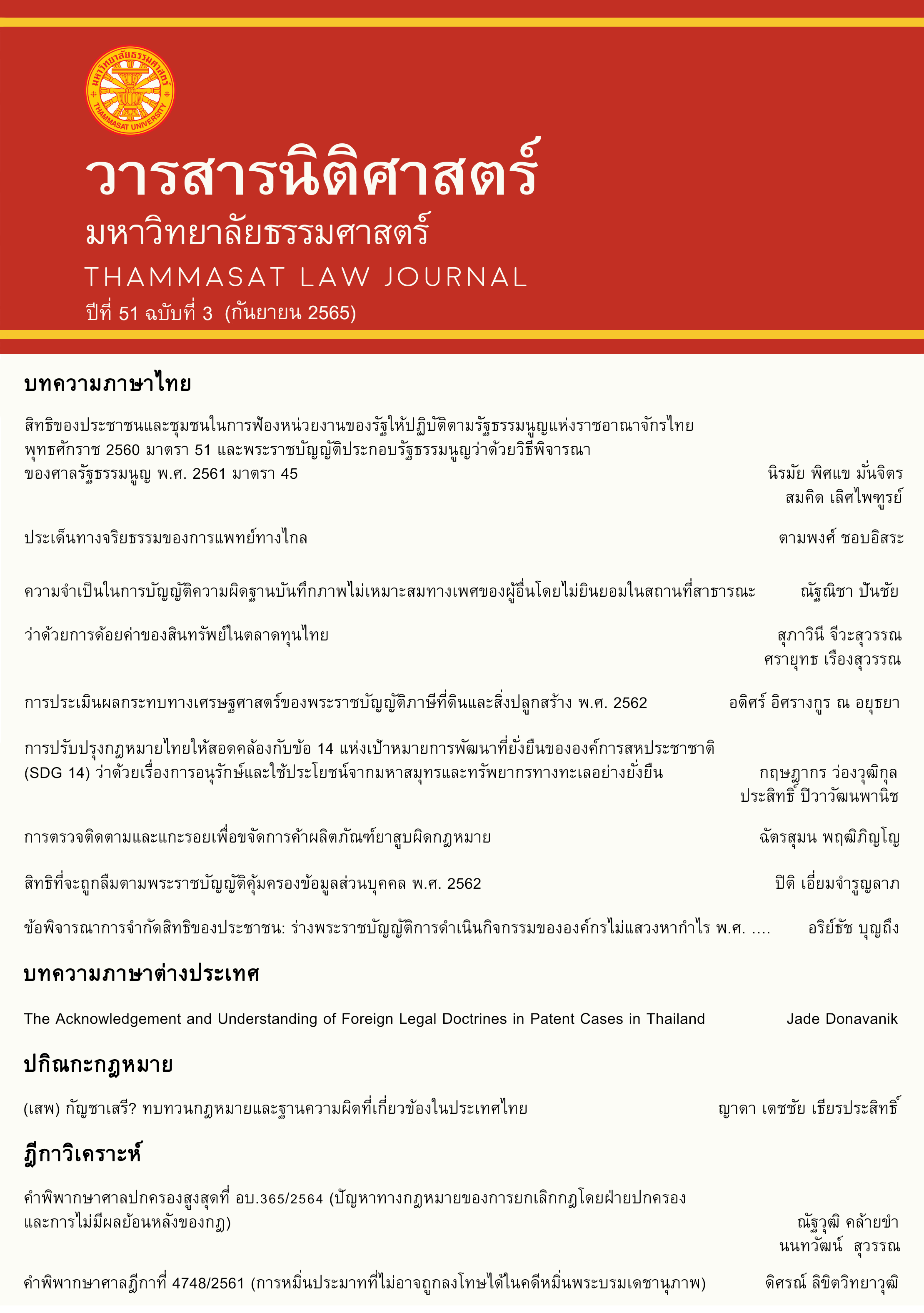สิทธิที่จะถูกลืมตามพระราชบัญญัติคุ้มครองข้อมูลส่วนบุคคล พ.ศ. 2562
คำสำคัญ:
สิทธิที่จะถูกลืม, การลบทำลายข้อมูลส่วนบุคคล, การนำข้อมูลส่วนบุคคลออกจากการแสดงผลบทคัดย่อ
สิทธิของเจ้าของข้อมูลส่วนบุคคลตามมาตรา 33 แห่งพระราชบัญญัติคุ้มครองข้อมูลส่วนบุคคล พ.ศ. 2562 ประกอบกับหน้าที่ของผู้ควบคุมข้อมูลส่วนบุคคลตามมาตรา 37(3) แห่งพระราชบัญญัติคุ้มครองข้อมูลส่วนบุคคล พ.ศ. 2562 นั้นมีคุณสมบัติที่จะเรียกได้ว่า “สิทธิที่จะถูกลืม” สอดคล้องกับหลักการทางทฤษฎีสากลเกี่ยวกับสิทธิที่จะถูกลืม ตัวบทกฎหมายคุ้มครองข้อมูลส่วนบุคคล บรรทัดฐานการใช้บังคับ และแนวปฏิบัติที่เกี่ยวข้องในต่างประเทศได้แก่ สหภาพยุโรป สหราชอาณาจักร ประเทศออสเตรเลีย ประเทศญี่ปุ่น เขตปกครองพิเศษไต้หวัน เขตปกครองพิเศษฮ่องกง ประเทศฟิลิปปินส์ และประเทศสิงคโปร์ แม้ว่าพระราชบัญญัติคุ้มครองข้อมูลส่วนบุคคล พ.ศ. 2562 จะไม่ได้บัญญัติถึงสิทธิที่จะถูกลืมเอาไว้โดยชัดแจ้งในตัวบทกฎหมาย เพื่อให้เกิดความชัดเจนเกี่ยวกับการปฏิบัติหน้าที่ตามกฎหมายของผู้ควบคุมข้อมูลส่วนบุคคล โดยเฉพาะอย่างยิ่งในกรณีของผู้ให้บริการสืบค้นข้อมูลออนไลน์ และเพื่อรองรับข้อเท็จจริงที่ว่าการสื่อสารแลกเปลี่ยนความคิดของคนในสังคมนั้นเกิดขึ้นในโลกดิจิทัลมากขึ้น บทความนี้จึงเสนอให้เพิ่มเติมคำว่า “สิทธิที่จะถูกลืม” ในมาตรา 33 และมาตรา 37(3) แห่งพระราชบัญญัติคุ้มครองข้อมูลส่วนบุคคล พ.ศ. 2562 การแก้ไขกฎหมายตามข้อเสนอดังกล่าวจะช่วยให้เกิดความชัดเจนว่าหากผู้ให้บริการสืบค้นข้อมูลได้ดำเนินการนำเอาข้อมูลส่วนบุคคลออกจากการแสดงผลการค้นหาแล้วก็ย่อมถือได้ว่าปฏิบัติหน้าที่ตามกฎหมายแล้ว โดยไม่ต้องดำเนินการเพื่อลบหรือทำลายข้อมูล และเมื่อผู้ให้บริการสืบค้นข้อมูลได้ดำเนินการนำข้อมูลส่วนบุคคลออกจากการแสดงข้อมูลแล้วก็ย่อมถือได้ว่าปฏิบัติหน้าที่ตามกฎหมายแล้วโดยไม่ต้องกังวลว่าจะมีความรับผิดตามพระราชบัญญัติคุ้มครองข้อมูลส่วนบุคคล พ.ศ. 2562 เนื่องจากการฝ่าฝืนกฎหมาย นอกจากนี้ งานวิจัยนี้ยังเสนอให้คณะกรรมการคุ้มครองข้อมูลส่วนบุคคลอาจประกาศกำหนดหลักเกณฑ์ในการลบหรือทำลาย หรือทำให้ข้อมูลส่วนบุคคลเป็นข้อมูลที่ไม่สามารถระบุตัวบุคคลที่เป็นเจ้าของข้อมูลส่วนบุคคลตามวรรคหนึ่งก็ได้ตามมาตรา 33 วรรคท้ายแห่งพระราชบัญญัติคุ้มครองข้อมูลส่วนบุคคล พ.ศ. 2562 การออกกฎหมายลำดับรอง (หรือแนวปฏิบัติ) ดังกล่าวอาจดำเนินการโดยอาศัยแนวปฏิบัติของต่างประเทศ
เอกสารอ้างอิง
Aidan Forde, ‘Implication of the Right to Be Forgotten’ (2015) 18 Tulane Journal of Technology and Intellectual Property 83.
Anita L. Allen, ‘Privacy-as-Data Control: Conceptual, Practical, and Moral Limits of the Paradigm’ (2000) 32 Connecticut Law Review 861
Article 29 Data Protection Working Party, ‘Guidelines on the Implementation of the Court of Justice of the European Union Judgment on “Google Spain and Inc v. Agencia Espanola De Proteccion De Datos (AEPD) and Mario Costeja Gonzalez C-131/12’ (Article 29 Data Protection Working Party, November 2014) accessed 5 August 2021.
Cécile de Terwangne, ‘The Right to be Forgotten and the Informational Autonomy in the Digital Environment’ (EU Commission, 2013) <https://publications.jrc.ec.europa.eu/repository/bitstream/JRC86750/jrc86750cecile_fv.pdf> accessed 2 October 2021.
Global Freedom of Expression, ‘Hurbain v. Belgium’ (Columbia University, June 2021) <https://globalfreedomofexpression.columbia.edu/cases/hurbain-v-belgium/> accessed 28 August 2022.
Global Freedom of Expression, ‘Plaintiff X v. PrimaDaNoi’ ( Columbia University, 2015) <https://globalfreedomofexpression.columbia.edu/cases/plaintiff-x-v-primadanoi/> accessed 1 October 2021.
ICO, ‘Deleting personal data’ (ICO, February 2014) <https://ico.org.uk/media/for-organisations/documents/ 1475/deleting_ personal_data.pdf> accessed 3 October 2021.
Jed Rubenfeld, ‘The Right of Privacy’ (1989) 102 Harvard Law Review 737.
Jeffrey Rosen, ‘The Right to Be Forgotten’ (2012) 64 Stanford Law Review Online 88.
Marko Milosavljević, Melita Poler, and Rok Čeferin, ‘In the Name of the Right to be Forgotten: New Legal and Policy Issues and Practices regarding Unpublishing Requests in Slovenian Online News Media’ (2020) 8(6) Digital Journalism 780.
Mélanie Dulong de Rosnay and Andrés Guadamuz, ‘Memory Hole or Right to Delist? Implications of the Right to be Forgotten for Web Archiving’ (RESET, 19 April 2019) <http://www.researchgate.net/publication311997712_Memory_Hole_or_Right_to_Delist_Implications_of_the_Right_to_be_Forgotten_for_Web_Archiving/link/59deef990f7e9bcfab24773f/download> accessed 2 October 2021.
Michael J. Kelly and David Satola, ‘The Right to Be Forgotten’ (2017) 1 University of Illinois Law Review 1.
Office of the Australian Information Commissioner, ‘The Australian Privacy Principles From Schedule 1 of the Privacy Amendment (Enhancing Privacy Protection) Act 2012’ (OAIC, January 2014) <https://www.oaic.gov.au/__data/ assets/ pdf_file/0006/2004/the-australian-privacy-principles.pdf> accessed 5 March 2022.
Patrick C. File, ‘A History of Practical Obscurity: Clarifying and Contemplating the Twentieth Century Roots of a Digital Age: Concept of Privacy’ (2017) 6 University of Baltimore Journal of Media Law & Ethics 4.
PDPC, ‘Media Statement: ‘PCPD Welcomes Administrative Appeals Board's Decision on Dismissing David Webb’s Appeal Case’ (PDPC, October 2015) <https://www.pcpd.org.hk/english/news_events/media_statements/press_20151029.html> accessed 17 November 2021.
PDPC, ‘X v Privacy Commissioner for Personal Data (Administrative Appeal No. 15/2019)’ (PDPC , July 2014) <https://www.pcpd.org.hk › files › AAB_15_2019> accessed 28 August 2022.
Rolf H. Weber, ‘The Right to Be Forgotten More Than a Pandora’s Box?’ (2011) 2(2) Journal of Intellectual Property, Information Technology and E-Commerce 120.
Shaniqua Singleton, ‘Balancing a Right to Be Forgotten with a Right to Freedom of Expression in the Wake of Google Spain V. AEPD’ (2015) 44 Georgia Journal of International and Comparative Law 165.
Wen-Tsong Chiou. ‘Commentary on The Right to be Forgotten: Forget about It?’ (Ministry of Justice, July 2015)<https://cons.judicial.gov.tw> accessed 28 August 2022.
ดาวน์โหลด
เผยแพร่แล้ว
ฉบับ
ประเภทบทความ
สัญญาอนุญาต
ลิขสิทธิ์ (c) 2022 วารสารนิติศาสตร์ มหาวิทยาลัยธรรมศาสตร์

อนุญาตภายใต้เงื่อนไข Creative Commons Attribution-NonCommercial-NoDerivatives 4.0 International License.
ผลงานที่ตีพิมพ์ในวารสารนิติศาสตร์เป็นลิขสิทธิ์ของวารสารนิติศาสตร์ มหาวิทยาลัยธรรมศาสตร์ และวารสารนิติศาสตร์ มหาวิทยาลัยธรรมศาสตร์ สงวนสิทธิในการเผยแพร่ผลงานที่ตีพิมพ์ในแบบรูปเล่มและทางสื่ออิเล็กทรอนิกส์อื่นใด
บทความหรือข้อความคิดเห็นใด ๆ ที่ปรากฏในวารสารนิติศาสตร์เป็นความรับผิดชอบของผู้เขียนโดยเฉพาะ คณะนิติศาสตร์ มหาวิทยาลัยธรรมศาสตร์ และบรรณาธิการไม่จําเป็นต้องเห็นด้วยหรือร่วมรับผิดชอบใด ๆ



